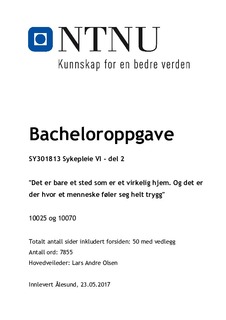| dc.contributor.advisor | Olsen, Lars Andre | |
| dc.contributor.author | Støvland, Hege Synnøve Kolbu | |
| dc.contributor.author | Hjelmeland, Malin Vinnes | |
| dc.date.accessioned | 2017-10-24T13:20:44Z | |
| dc.date.available | 2017-10-24T13:20:44Z | |
| dc.date.issued | 2017 | |
| dc.identifier.uri | http://hdl.handle.net/11250/2461894 | |
| dc.description.abstract | Hensikt: Hensikten med litteraturstudien er å finne ut hva pasienter i den palliative fasen ser på som viktig for at de skal føle seg trygge når de mottar palliativ pleie i hjemmet.
Metode: Systematisk litteraturstudie basert på seks kvalitativ og to kvantitative forskning artikler.
Resultat: Pasientene som mottok palliativ pleie i eget hjem fortalte om flere faktorer som de mente måtte være til stede for at de skulle føle seg trygge. Våre funn sier at det var viktig for pasientene å ha tillit til sykepleierne. Denne tilliten ble bekreftet når sykepleieren viste at hun var til å stole på og at hun hadde tilstrekkelig kompetanse. Det kom frem at ikke alle pasientene fikk tilstrekkelig symptomlindring, noe som førte til at de følte seg engstelige. Det var også svært viktig for dem at de ble sett på som et helt menneske og ikke bare en syk pasient.
Konklusjon: Sykepleierne trengte et løft i kompetansen innenfor palliativ pleie. Med flere kompetansedyktige sykepleiere vil dette være med på å styrke både kontinuiteten i sykepleien, kunnskap i forhold til informasjon og lindring av symptomer, samt en helhetlig sykepleie til både pasienten og deres pårørende. For å styrke kompetansen bør flere sykepleiere videreutdannes, mer fagutviklingsprosjekt og opplæring i kartleggingsverktøy og til palliativ plan. | nb_NO |
| dc.description.abstract | Aim: The purpose of the literature study is to find out what patients in the palliative phase are considering as important to make them feel safe when receiving palliative care at home. Method: Systematic literature study based on six qualitative and two quantitative research articles. Result: Patients who received palliative care in their own homes spoke of several factors that they considered to be needed to make them feel safe. Our findings say that it was important for patients to have confidence in the nurses. This confidence was confirmed when the nurse showed that she was trusworthy and that she had sufficient competence. It was found that not all patients received adequate symptomrelief, which led them to feel anxious. It was also important for them that they were seen as a whole human being and not just as a sick patient. Conclusion: Nurses needed a boost in the field of palliative care. With more competent nurses. This will help to strengthen both continuity in nursing, knowledge-related information and relief of symptoms, as well as comprehensive nursing for both the patient and their relatives. To strengthen competence, more nurses should be further educated, more professional development projects and training in mapping tools and for advanced palliative planning. | nb_NO |
| dc.language.iso | nob | nb_NO |
| dc.rights | Attribution-NonCommercial-NoDerivatives 4.0 Internasjonal | * |
| dc.rights.uri | http://creativecommons.org/licenses/by-nc-nd/4.0/deed.no | * |
| dc.subject | Palliative fase | nb_NO |
| dc.subject | Palliativ pleie | nb_NO |
| dc.subject | Tillit | nb_NO |
| dc.title | "Det er bare et sted som er et virkelig hjem. Og det er der hvor et menneske føler seg helt trygg" | nb_NO |
| dc.type | Bachelor thesis | nb_NO |
| dc.subject.nsi | VDP::Medisinske Fag: 700::Helsefag: 800::Sykepleievitenskap: 808 | nb_NO |
| dc.source.pagenumber | 50 | nb_NO |

